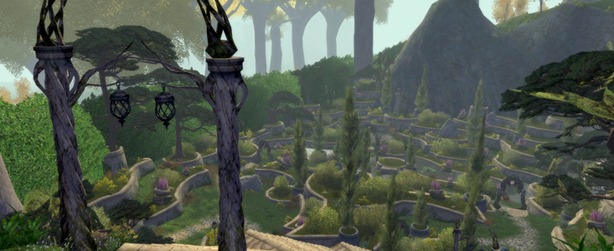Retaining Players
Age of Conan might have had an excellent opening, but the game suffered from a marked disparity between the experience offered in the first 20 levels in Tortage, and the experience players had once they went beyond this section. In effect, this left many players feeling conned."Levels one to 20 worked very well, and player feedback was extremely positive," Erling Elleson says. "The graphics looked amazing, the atmospheres were spectacular and the game proved to be fun for a lot of players. Servers were stable and everyone logged in. Combat worked wonderfully, people reacted well to it, and we received a lot of positive feedback. The problems arose when people left Tortage and went deeper into the game, and content holes became apparent."
In other words, the game became markedly less polished the further players advanced, and when many reached the end of their free month’s subscription, they failed to resubscribe. Now, less than 10 per cent of the people who paid for the boxed game continue to subscribe. Discussion of Age of Conan in some quarters is littered with references to broken promises about high-level content and PvP gameplay, not to mention the long-awaited DirectX 10 patch.
According to Turbine’s Jeffrey Steefel, fixing issues and constantly introducing new content is crucial to keeping players interested. "You have to acknowledge, immediately after launch, anything in the game that might not have been optimal, understand why that is and fix it. You need to make sure that you’re keeping the game fresh. That doesn’t mean reinventing it over and over again – in fact, reinventing a game isn’t a good thing to do and games that have tried it have had a difficult time – but when someone is paying for ongoing value, you need to provide them with more things to do."

LOTRO needs to find a balance between the tone of the Tolkien canon (recreating locations such as Lothlorien, pictured above) and the demands of modern gaming.
MMOs should have an advantage in that the developers receive direct feedback, both in terms of forum posts and the data they can pull from the servers. The challenge is, as Erling Ellingsen notes, "making sure we do the right things at the right time, add content where content is needed, and pay attention to the features that players want us to focus on." For Jeffrey Steefel, it’s about listening to the hardcore players. That said, he believes that developers need to be careful, as "these people tend to be the most confident in their opinions – the most vocal and vociferous – but they don’t necessarily represent the majority of the people playing the game."
Listening becomes particularly important when the developer starts making changes. In any MMO, changes are inevitable. As content is poured in, character classes need balancing and difficulty levels need adjusting. The trick to this tweaking, Jeff Steefel reckons, is that "you [should] never do it for tweaking’s sake. You do it for a specific goal or objective, and if that objective has been met then you stop whatever you’re doing until there’s a new objective."
In LOTRO’s Moria expansion, for example, Turbine introduced two new classes, namely the Warden and Rune-Keeper; this meant that, having spent ten months since launch balancing the classes, the team had to go back in and start again. "We’re still in the process of doing that," Steefel explains, "and one of the things that we knew to be true – we learned it from other games – and still seems to be true, is that it’s a painful process for our players, and for ourselves."
If a developer wants to keep players on board, it needs to understand why players find these changes so offensive.
Steefel calls this "technical listening", a process of looking at the complaints on the forums, then trying to tie these in to the data coming in from the servers.
"They’re game players, not game designers," he explains, "and they don’t always know how to tell you what they want, or what’s bugging them. You have to listen to them and work out what they’re really trying to say. They say, 'I hate this new feature that you’ve put in', and what they might actually be saying is, 'I like the feature – I just don’t like what it did to some other behaviour in the game.' But they’re not even aware that’s why it’s bugging them."
That said, one of the biggest mistakes a developer can make is to change an established, but not hugely successful game, in the hope of reversing its fortunes.
 Star Wars: Galaxies became infamous for its ‘New Game Experience’ patch – a redesign of the game’s classes and mechanics that was supposed to reach out and grab a wider audience, but instead succeeded only in alienating the game’s core following.
Star Wars: Galaxies became infamous for its ‘New Game Experience’ patch – a redesign of the game’s classes and mechanics that was supposed to reach out and grab a wider audience, but instead succeeded only in alienating the game’s core following.Since then, other games have faced similar accusations of chasing the WoW dollar instead of focusing on the game’s existing fans. Look on the forums, and you’ll see ex-players of Pirates of The Burning Sea lamenting a perceived shift of focus from historical accuracy and realistic naval encounters to melee combat, potions and supernatural encounters.
Even LOTRO, generally speaking one of the most respected MMOs, has been criticised for adding navigational aids and easier missions for new players, as well as a new class (the Rune-Keeper) whose magical attacks contravene the established Tolkien lore. "We feel betrayed," states SiSL, an annoyed player on Turbine’s forums. "We’ve chosen to play your game because it was Middle-Earth... if we were average game players who enjoyed such low-level flashy additions, there would be lots of other games to choose from."

MSI MPG Velox 100R Chassis Review
October 14 2021 | 15:04










Want to comment? Please log in.